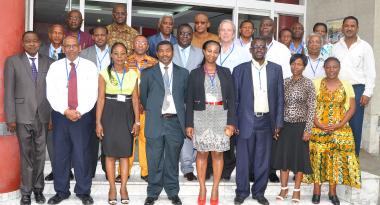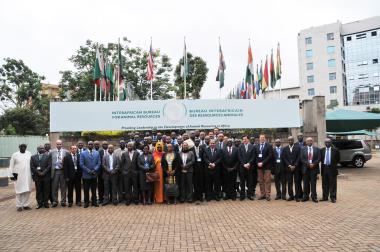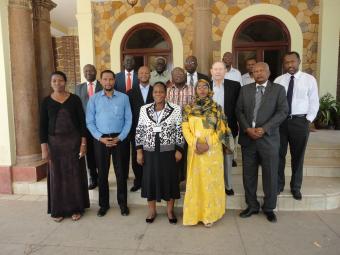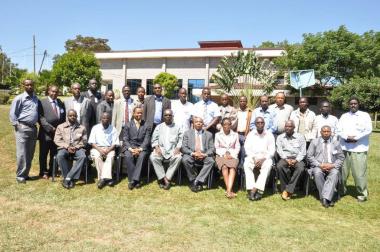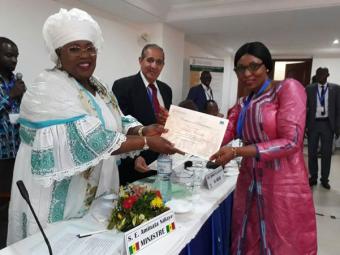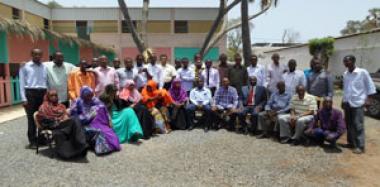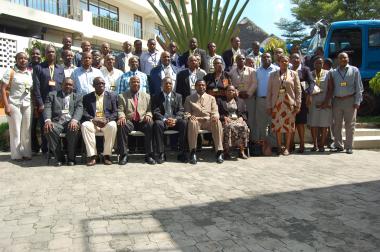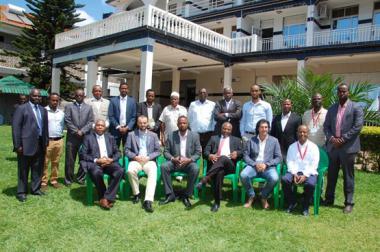The Livestock sector in Africa exhibits lack of integrated information management processes. This limits the provision of real-time livestock information and knowledge to facilitate decision making among livestock actors at regional and continental level. These observations led over 240 delegates from 43 African countries to publish a communique on Thursday 8th August 2019, in Cairo, Egypt, that among other common interventions identified the need for efficient Information Systems Management as a catalyst to the sustainable intensification of Regional Livestock Value Chains in Africa. The various stakeholders identified the need for more integrated information sharing across the RLVCs through the development of information modules specifically on: Poultry (meat and eggs) for Central Africa; Dairy for East Africa; Meat and live animals for IGAD; Dairy for North Africa; Meat and live animals for Southern Africa; and Poultry for West Africa.
Proceeding the Cairo meeting, AU-IBAR once again convened 160 stakeholders from 50 African countries at a Systemic Capacity Building Continental Workshop: Information Systems, Knowledge Management, and Technology. The consultative workshop was held in Nairobi, Kenya held from 3-7 February, 2020. The workshop built upon agreed intervention areas identified during the Stakeholder’s Stocktaking Workshop, to improve the information need capacity of member countries across RLVCs. The workshop attendees comprised livestock value chain actors such as extension agents, Departments of Livestock, and policy makers who were in a position to affect the resources, market orientation and competitive advantage of smallholders, consequently impacting financial performance of the value chain.
Speaking during the official opening of the workshop, AU-IBAR’s Executive Director, Prof. Ahmed El-Sawalhy highlighted existing gaps in Sub-Saharan Africa in terms of current data on livestock. He noted that as a result, most livestock value chain actors lacked adequate quality information to support decision making at regional level. Consequently, a key intervention of the work attendees involved identifying critical data content for the selected priority Regional Livestock Value Chains.
The Systemic Capacity Building Continental Consultative Workshop was framed within the broader continental frameworks such as the Livestock Development Strategy for Africa (LiDeSA) that takes a two-pronged approach providing a comprehensive agenda to drive livestock sector economic contribution (including intra and inter-regional trade and promotion of sustainable livelihoods). Additionally, the Comprehensive Africa Agriculture Development Programme (CAADP), the 2014 Malabo Declaration, and the AU Agenda provided the justification for the consultative workshop. The Malabo Declaration precisely renewed the commitments to the CAADP made in 2003, broadened the themes of the workshop and provided targets to be achieved by 2025: Some of the targets that were relevant to the Systemic Capacity Building Continental Consultative Workshop include: The exploitation of regional complementarities and cooperation to boost growth; The use of partnerships and alliances including farmers, agribusiness and civil society; Supply of appropriate knowledge, information, and skills to users; and to promote and strengthen platforms for multi-actor interactions.
Additionally, the strengthening of RLVCs was viewed as an enabler to the implementation of the Africa Continental Free Trade Area (AfCFTA). AU-IBAR’s Executive Director, Prof. Ahmed El-Sawalhy observed that the major focus of the AU reforms is to promote inter and intra-regional trade. He highlighted that: ‘These Regional value chains can as well be viewed as building blocks to global value chains....and there logical that integrating into the global economy will require Africa to first look inwards: by creating successful regional value chains, African economic actors might become competitive enough to enter global value chains.’’
A major agreement of the workshop stakeholders was the need to utilise the Animal Resources Information System 3 (ARIS 3) in developing modules that would facilitate the information needs of the various stakeholders in the various RLVCs. It was felt that the role of an Information System such as ARIS 3 in RLVCs would be to build linkages across African Member States for commodity, livestock products, and livestock animal sales, evaluate influences of commodity price changes on livestock value chain, provide opportunities for use of surplus commodities as supplemental feed, and used as a common platforms of information dissemination and knowledge transfer.
Post workshop interventions have involved the development of a Continental Data Collection System (DCS) to facilitate the process of data collection, to allow specific, structured information on RLCVs to be gathered systematically, and subsequently enabling data analysis to be performed on the information. Modules will be developed in ARIS 3 to accommodate all the specific Regional Livestock Value Chains on Poultry, Dairy, Meat, and Live Animals.
The continental workshop was held under the umbrella of the African Union InterAfrican Bureau for Animal Resources Sustainable Development of Livestock for Livelihoods (Live2Africa), with the support from the European Union. Live2Africa provides the catalyst needed to ensure that the livestock sector becomes one of the most important contributors to the African common market through the development of Regional Livestock Value Chains (RLVCs) which will harness regional complementarities and economy of scale.

